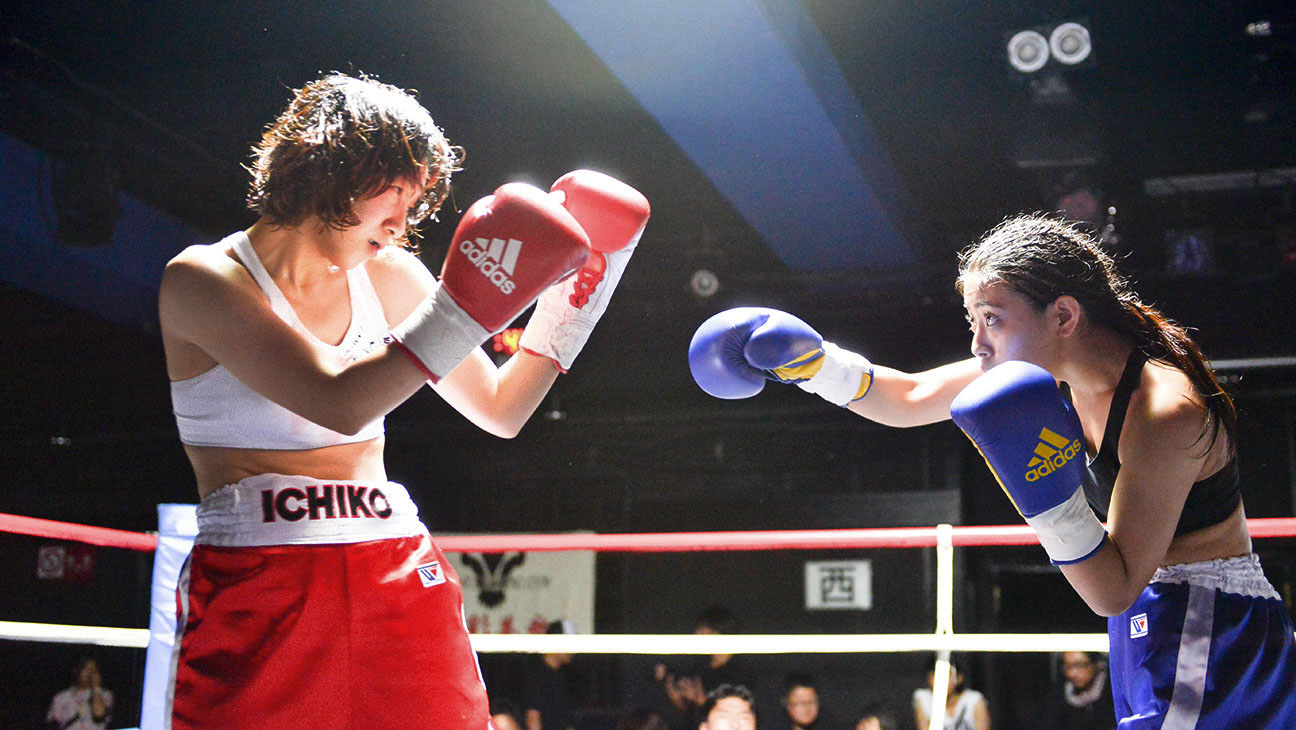By Chlotrudis Independent Film Society
Rating: 4.25 cats
Director: Masaharu Take

Original language title: Hyakuen no koi
Country: japan
Year: 2015
Running time: 113
IMDB: Sakura Ando; Miyoko Inagawa; Ruka Wakabayashi;Tadashi Sakata; Toshie Negishi
Jason says: “Sakura Ando wears some baggy clothes toward the start of 100 YEN LOVE, because she’s actually fairly attractive but this is a character who needs to burn off her frustrating slacker exterior, and that’s how it’s going to come across visually. It’s the kind of thing that’s fairly obvious when you know that this is going to be a boxing movie going in, although maybe less so otherwise. The willingness to go where the story leads is one of this occasionally odd movie’s charms, though.
“As it starts, Ichiko Saito (Ando) is 32, a college dropout living with her parents, and not exactly doing much to help out at the family bento stand. Her sister Fumiko (Miyoko Inagawa) and nephew Taro (Ruka Wakabayashi) have also moved back in after Fumiko’s divorced, and if Ichiko and Fumiko didn’t get along as kids… Soon Ichiko has moved out and taken a job at the 100-yen store down the street, which has its own odd group – fellow employee Numa (Tadashi Sakata) is a creep, former employee Ikeuchi (Toshie Negishi) is always coming by to get day-old sandwiches, and guess what ‘banana man’ Yuji Kano (Hirofumi Arai) buys a lot of. At 38, Yuji is facing his last chance to make it as a professional boxer, but it’s not necessarily shacking up with him that turns Ichiko’s attention that way.
“This movie can take some pretty random turns, with even some of the more direct routes not necessarily coming across as straightforward. For all that Ichiko seems like kind of a lazy lump at the beginning, seeming a lot more responsible and kind than one might expect as she starts her new job, and though she appears to learn how to box almost on a whim despite the fact that this decision comes right on the tail of her being attacked – a series of events that gives the audience all the cringe-worthy parts and then hints at a follow-up though any resolution happens off-screen. Even once she starts learning to box and has the expected training montages, things play out due to a large helping of chance and decisions that don’t necessarily seem reasonable. Writer Shin Adachi never really gives Ichiko someone to confide in, or voice-over to explain her reasoning directly to the viewer, and the outside factors that affect a person’s life are kept well outside the audience’s view in this case.
“Because Ichiko is so resistant to explaining herself, what would be obvious connections in other movies can be hard to make – she’s a weird mess of conflicting motivations that making a conventionally triumphant sports or romance about her seems pretty difficult. That puts a lot on Sakura Ando’s shoulders, and she’s not going to go for the sort of emoting that mskes it easy on the audience. And yet, even when Ichiko comes across as numb and inactive, Ando tends to get something across, whether it be self-loathing or irritation at those trying to engage her despite her disinterest. When she’s learning to fight, there’s an intriguing but subtle tug-of-war between the satisfaction of becoming good at something and the uncertainty that requires proof – which isn’t far off from how her being in love plays out. Ando gives the sort of performance that one comes to appreciate over the course of a film but which wouldn’t look like much in a minute-long awards clip.
“Her co-stars tend to be a little more expressive, although it’s perhaps appropriate that the most important, Hirofumi Arai, is tasked with making Yuji Kano the same sort of difficult nut to crack as Ichiko, although his more obviously peculiar behavior gives him a somewhat different feel, and he’s not often called upon to present a good heart underneath his indifference or selfishness. He still has some of the same underdog appeal as Ichiko, but also some of the instability of the more troubled characters. Toshie Negishi is similarly memorable as the likely homeless Ikeuchi, really nailing the person whom one wants to help out without actually being around her. Tadashi Sakata gives Numa a vibe that starts out as creepy and builds more than expected.
“For a movie that bounces around and, when you start listing things out, heaps a lot of unpleasant material onto Ichiko, it never feels like a downbeat slog or pieced together. Director Masaharu Take builds a film that feels immediate and down on the ground with its scraping-by heroes, but never condescends. He navigates the seeming randomness by never signaling the audience should be shocked, or changing up the style in an obvious way, although you can see the sports-movie feel pick up in the second half. Even then, though, there’s something impressively honest and non-glamorous about the matches we see, a feeling that who these characters are takes priority over their athletic prowess.
“It can be a bit hard to embrace the film’s ending – the audience is thinking ‘f— that noise’ where certain things are concerned, and in most movies Ichiko being there as well would be the entire point. Coming at the end of an uncomfortable but kind of unsurprising finale, it’s a weird way to end the movie, although in some ways that’s only appropriate – Ichiko just isn’t going to follow a conventional arc, no matter how one might want her to, and the film is right there with her. 4.25 cats
“Seen 22 July 2015 in the J.A. de Sève Cinema (Fantasia International Film Festival, DCP)”
